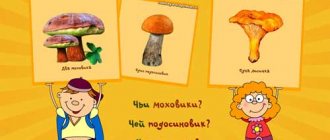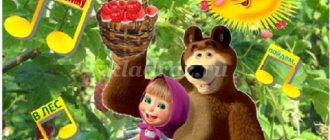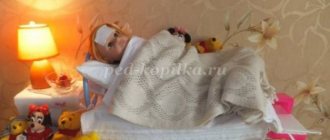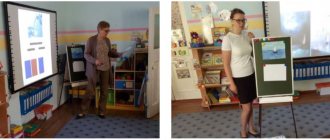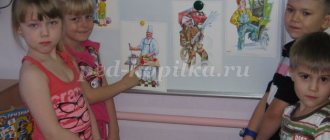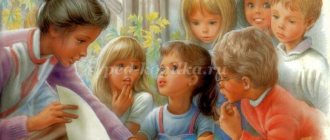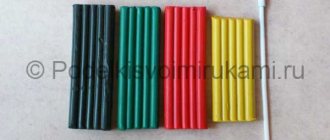Developmental lesson for a psychologist: “Studying professions”
Progress of a psychologist's lesson in kindergarten on the topic of profession
1. Greeting exercise.
Children sit in a circle. Among the various cards depicting the children's emotions, participants choose one that symbolizes their current mood and greets all the children. For example, “Hey, I'm happy today!” You can download cards with emotions at the bottom of the article.
2. Game "Loto".
Children are given large cards with a picture of a representative of a certain profession. Small cards depicting objects symbolizing a particular profession are placed in the center with the image down. Children take turns taking small cards and name which profession what is depicted there is suitable for. Children look for the right profession among their large cards. Lotto cards can be downloaded here and here (we have 2 options, choose which one you like best).
3. Dynamic game.
The children get up and stand in a row. The psychologist throws the ball one by one and names the beginning of the sentence. The children must continue. “I can..”, “I can...”, “What I do best is...”, “Dad taught me...”, “Mom taught me...”, “I taught myself...”, “I love to do...”. Sentences may be repeated, but the child must respond differently. This is done so that the child realizes how much he can do. This exercise is aimed at developing self-esteem, and updating and remembering the child’s capabilities and skills.
4. Game "Tower".
Discuss the construction profession with your children. What are they doing? What do they need for work? What machines help them? What are they building? In the middle of the table there are various geometric shapes. Templates can be downloaded at the bottom of the article.
The psychologist builds a tower using various figures, and the children need to reproduce it. The task can be complicated - show the children the tower for only half a minute, then cover it with an A4 piece of paper and ask them to reproduce from memory what they saw. This game develops thinking, memory and is aimed at studying geometric shapes.
5. Dynamic game “Miniature”.
The psychologist asks the children what is the name of the profession of the people who drive the bus, collect money for travel and hand out tickets on the bus. Children are given the roles of driver and conductor. All the rest are passengers, who are given 5 “coins” each (you can take buttons). Tickets are also provided to the conductor. Children stand in a row (“sit” on an imaginary bus) and the game begins. The psychologist notes that the fare is 3 coins (children must count and give money to the conductor, who must provide the ticket). The psychologist tells a story about how the bus drives, where it is going, who is driving, what is around “look to the right, look to the left...”, which passengers are sitting, how the conductor collects money.
6. Game “Make a story.”
Cards with images of representatives of different professions (can be downloaded below) and cards with images of various objects (you can use lotto cards) are laid out in front of the children (5-6 cards in total for one story). Children are asked to take turns making up a story using everything on the cards.
7. Application “Soup and compote”.
The psychologist asks the children in more detail about the profession of a cook (what exactly do these people do, who likes to eat what dishes, perhaps one of their relatives works as a cook, someone wants to become one in the future...). Then the children sit at tables, where they glue the applique together with the psychologist. It consists of the following elements: stove, 2 pans, vegetables, fruits (you can download the template below). Children need to put on a stove, 2 pans in which to place vegetables (soup) separately and fruits (compote) separately. For a steam effect, you can glue strings over the pans. Then, to develop communication skills, they ask the question: “if the compote was only made from apples, what would it be called? (apple). What if it were made from raspberries, strawberries, apricots, plums, cherries...”
8. Farewell exercise.
Children pair up and on each other’s sheet must write the first letter of the profession that they liked best.
The one to whom they write must guess. Then the children change places. Attachments:
| File | Description | File size: |
| Lotto cards 1.docx | 462 KB | |
| Cards for lotto 2.docx | 2138 KB | |
| Profession cards.docx | 3471 KB | |
| cards with emotions.docx | 225 KB | |
| Application template.docx | 2201 KB | |
| Templates geometric shapes.docx | 41 KB |
Abstract of OOD "Professions" for children of the preparatory group
Abstract of OOD "Professions" for children of senior preschool age.
Topic: “All work is good” Purpose : To clarify children’s knowledge about certain professions and tools. Objectives: Educational: 1. Generalize children's knowledge about professions 2. Form ideas about the profession of a designer 3. Continue to perform applications based on plasticine 4. Improve skills in forming actions from the names of objects, enrich vocabulary Developmental : 1. Develop coherent and dialogic speech, ability to answer questions 2. Develop constructive skills 3. Develop memory, attention, logical thinking, creative imagination, artistic taste. Educational: 1. Cultivate a respectful attitude towards working people 2. Cultivate a desire to provide assistance. Materials: envelope, riddles about professions, pictures depicting people of different professions, ball, cardboard, plasticine, peas, seeds, oilcloth.
Progress of the lesson:
Educator: I have an unusual envelope, let's see what's in it? There are a lot of mysteries here. Shall we guess? I fuss with the kids, I spend all my days with them, I go for walks with them. I put them to bed, and, of course, I love my profession. (Teacher) Shovels the snow, Sweeps the yard with a broom, Have you guys guessed who keeps it clean? (Janitor) If the flames are swirling, Smoke is pouring out in a column, we dial “01”, We will call Him for help. (Firefighter) Since morning he has been cooking soup, compote and porridge in our dining room. (Cook) He is dressed in overalls, He deftly paints the frames, He whitewashed the ceiling, He helped make repairs. (Painter) He will cure measles, and bronchitis, and sore throat, and will prescribe pills and vitamins. (Doctor) He has mountains of goods - Cucumbers and tomatoes. Zucchini, cabbage, honey - he sells everything to people. (Seller) We work as a team, they bring us sand and concrete. We need to work together to build a new house. (Builders) Use a hairdryer, brush and comb to deftly do your hair. (Hairdresser) Educator . How can you name all the answers in one word? - Well done, we will talk about professions today. - What is a profession? (answer) - A profession is work to which a person devotes his entire life. Every morning, the adult members of your family go to work. — Why do people need professions? (Answer) Didactic game “Who can tell you better about their profession”
Educator.
On the table there are pictures depicting people of different professions. You need to talk about what a person in this profession does, explain what you need to know and be able to do to be a good professional. (Child's story) Educator . And now I want to test how carefully you can listen. You and I will play the game “Who owns the phrase? " I read out a phrase, and you answer what profession a person could say this phrase. How to cut your hair? How about shorter bangs? (Hairdresser.) Children, hello, open your textbooks to page 33. (Teacher.) Bring bricks and cement. (Builder.) Today I will paint a landscape. (Artist.) Open your mouth and say “a-a-a-a-a-a-.” (Doctor.) What buttons should you sew on this blouse: white or black? (Tailor.) How many kilograms of potatoes should you weigh? 25 rubles from you. (Seller.) Well done, I guessed all the professions correctly. Educator: Let's play a ball game. I will name the tools, and you will answer what actions are performed with them. With a knife (cut, with a broom (sweep, with a saw (sawing), with a watering can (watered), with an ax (chop, with a shovel (dig), with a needle (sew, with scissors (cut), with a comb (combed), on a scale (weighed), in a saucepan (cooked, in a frying pan ( fry, thermometer (measure, brush (draw, hammer, ruler, tablets, paints, etc.) Educator: Sentences are written on the sheet about how people of different professions work, but mistakes were made there. Try to find them. (Game “Confusion” "" The cook prepared delicious oak. (Soup.) A rook came to the sick man. (Doctor.) The gardener waters the flowers from the neck. (Washing can.) The driver sits at the sack. (The steering wheel.) The tailor sewed the lament. (Cloak.) In full view kids The painters are painting the rat (The roof) They say that a fisherman caught a shoe in the river. But then he got a hook on a house. (Catfish) Well done! Educator: The next task is “The Fourth Odd One.” I will name the tools that people of a certain profession use. One of the tools does not belong to this profession. Identify it. Scissors, scales, mirror, comb. Primer, pointer, saucepan, globe. Saw, pills, thermometer, syringe. Sewing machine, centimeter, watering can, needle. Frying pan, knife, ladle, brushes. Hammer, paints, thermometer, rake. Educator: Do you know this proverb: “Labor feeds a man, but laziness spoils him”? Try to explain the meaning of this proverb? That's right, every person must work to live. Educator : Today we will get acquainted with the profession of a designer. Designer is a new and very necessary profession. It helps us design the appearance of things. A designer is like a wizard: dishes, furniture, paintings, toys, and clothes turn into real works of art in his hands. Tell me, what animal will the New Year be dedicated to? (Year of the Horse) Educator: Today we, like real designers, will make a “horse” craft. What do you think we will do first? (Trace the horse along the stencil, then spread plasticine along the contour, glue peas and seeds). Educator: Well done, children. You got a lot of beautiful, unusual horses because we tried. Every person must do his job well. After all, any work benefits people. And we already know that all professions are important.
We recommend watching:
Notes on educational activities in the senior group on the topic: All professions are important. Notes on an open integrated lesson in the senior group. Professions GCD on familiarization with the environment and development of speech in the senior group on the topic: Professions
Similar articles:
Children about the artist profession
Children about the accounting profession
Children about the profession of shoemaker
Children about the military profession
Children about the sales profession
